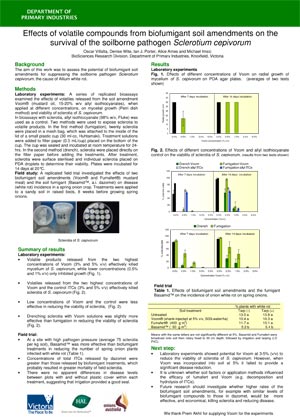|
This work assesses the potential of biofumigant soil amendments to suppress the soilborne pathogen Sclerotium cepivorum, the cause of onion white rot.
Work included replicated field trials to investigate the effects of two biofumigant soil amendments (Voom& mustard meal) and the soil fumigant (Basamid&, a.i. dazomet) on disease incidence in a spring onion crop.
Authors
|
Oscar Villalta
|
Ian Porter
|
Alice Ames
|
Denise Wite
|
Michael Imsic
|


Results
- Volatile products released from high levels of Voom&; killed mycelium of S. cepivorum, while lower concentrations only inhibited growth.
- Drenching sclerotia with Voom&; solutions was slightly more effective than fumigation in reducing the viability of sclerotia.
Field trials
- Basamid&; was more effective than biofumigant treatments in reducing the number of spring onion plants infected with white rot.
- Basamid&; released higher levels of active compounds and resulted in greater control of field sclerotia than mustard meal.
- There were no apparent differences in disease levels with or without plastic covers, suggesting that irrigation provided a good seal
|

